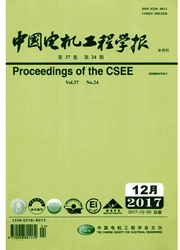

 中文摘要:
中文摘要:
模型预测控制是一种优化控制算法,其突出优点在于控制算法嵌入显式过程模型并且直接考虑被控过程的输入、状态和输出的约束条件,近年来成为电力工业复杂系统研究的热点。该文全面综述了模型预测控制在电力生产过程和电力系统自动发电控制中的应用现状。在电力生产过程控制中,模型预测控制可实现子系统的节能控制,也可实现机炉协调控制以满足约束条件下跟踪负荷需求。监督预测控制可实现厂级优化控制。在电力系统自动发电控制中,模型预测控制可满足发电机变化率约束,减少机组疲劳和磨损,符合CPS标准。最后阐述了理论与应用方面有待进一步研究的几个主要问题。
 英文摘要:
英文摘要:
Model predictive control(MPC) is a typical optimal control algorithm,which incorporates an explicit process model into the control calculation.The key to its popularity is its ability to take systematic account of process input,state and output constraints,thereby allowing processes to operate at the limits of achievable performance.Thus it has been a major concern in the complex power industrial control application.This paper overviews the new development of the model predictive control in the application of power plant production process control and power system automatic generation control.In power plant control,MPC has been widely used to realize the energy saving control in sub-systems,and the coordinated control to ensure a higher rate of load following capability without violating the thermal constraints.Also supervisory predictive control is used to further improve the plant-wide optimization.In power system automatic generation control(AGC),MPC is used to solve the generation rate constraint(GRC) problem,meanwhile to reduce wear and tear of generating unit's equipments.MPC can also assures compliance with control performance standards CPSl and CPS2 set by NERC.Finally,the paper presents future research work both in theory and practice aspects.
 同期刊论文项目
同期刊论文项目
 同项目期刊论文
同项目期刊论文
 Robust H output feedback control for a class of networked cascadecontrol systems with uncertain dela
Robust H output feedback control for a class of networked cascadecontrol systems with uncertain dela H-Infinity State Feedback Control for a Class of Networked Cascade Control Systems With Uncertain De
H-Infinity State Feedback Control for a Class of Networked Cascade Control Systems With Uncertain De Modeling of a 1000 MW power plant ultra super-critical boiler system using fuzzy-neural network meth
Modeling of a 1000 MW power plant ultra super-critical boiler system using fuzzy-neural network meth Comprehensive Assessment for Thermal Power Unit Operation State based on Multi-level Grey Relational
Comprehensive Assessment for Thermal Power Unit Operation State based on Multi-level Grey Relational 期刊信息
期刊信息
